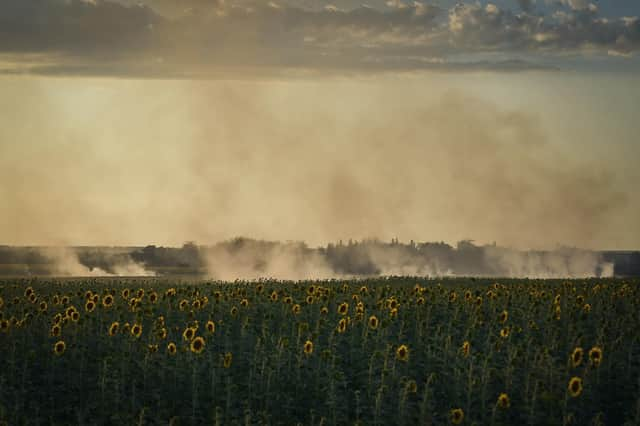Canon Ian Ellis: Russian decision to end grain deal is the latest disaster in Ukraine


The implications for millions of people across the globe were, and remain, devastating. The grain deal had been brokered in July last year by Turkey and the UN, securing the safe passage of grain shipments from Ukrainian ports. The involvement of Turkey was not only on account of its role in overseeing the 1936 Montreux Convention on the Turkish Straits but also because of Turkish President Recep Tayyip Erdoğan's particular relationship with Russia's Vladimir Putin.
Turkey was also recently involved in an exchange of prisoners between Russia and Ukraine, but the former was indignant when the commanders who had resisted the Russian forces at the embattled Azovstal steel works in Mariupol returned to Ukraine, whereas Russia claimed that under the exchange agreement the men were to remain in Turkey. They were received in their homeland as heroes and pledged to return to the task of defending of their country.
Advertisement
Hide AdAdvertisement
Hide AdWhen the grain deal was ended last month, foreign secretary James Cleverly condemned the move “in the strongest terms”, adding that “Russia’s illegal war against Ukraine has obstructed the free flow of grain and other foodstuffs through the Black Sea, causing worldwide suffering”.
He said that the UK urged Russia to re-join the initiative, and to allow “the unimpeded export of grain”. Mr Cleverly also made it clear that the target of UK sanctions was “Russia’s war machine and not the food and fertiliser sectors”, stating: “Contrary to Russian claims, the UN and other partners have taken significant steps to ensure that Russian food is able to access world markets.” As evidence for this, he said that Russian exports of food were at higher levels than before the country's invasion of Ukraine.
The humanitarian cost of Russia's withdrawal from the Black Sea Grain Initiative, with the UN estimating that without it the number of undernourished people worldwide could increase by millions, has similarly led to deep concern within the churches. The international development agency, Christian Aid, has said that Russia's unilateral decision had once again put so many at risk from rising food prices and had exposed “the fragility of the world's food system”. Christian Aid's Humanitarian and Hunger Policy Adviser, Lydia Mbogoro, added that while food prices have come down from their peak, the loss of millions of tonnes of key staples from the Black Sea would further push countries closer to famine.
Attempts to revive the grain deal will no doubt continue, with Turkish Foreign Minister Hakan Fidan reportedly having discussed the matter in a call with US Secretary of State Antony Blinken on August 5, according to a Reuters news agency bulletin. The grain issue also loomed large on the international stage during this month's Saudi Arabia sponsored peace talks which, as reported in the News Letter (August 8), gathered senior representatives of some forty nations. These included China and India as well as the US and the UK, with the EU also represented. Russia was not invited.
Advertisement
Hide AdAdvertisement
Hide AdThe peace summit, held in Jeddah, followed an earlier but smaller summit earlier this year in Copenhagen. Relations between China and Saudi Arabia have this year seen the former broker a normalisation deal between the Saudi Kingdom and Iran, which took effect last March. Regarding the latest Ukraine peace talks, the Guardian reported an EU source as saying that China “participated actively and was positive about [the] idea of a third meeting at this level”.
It is difficult to know precisely what was achieved, but Ukraine itself was certainly positive about the talks. Kyiv's representative, Andriy Yermak, Head of the Ukrainian Presidential Office, commented after the Jeddah summit: “We had very productive consultations on the key principles on which a just and lasting peace should be built. We had an extremely honest, open conversation, during which representatives of each country could voice their position and vision.
“There were different views, but all the participants demonstrated their countries' commitment to the principles of the UN Charter, international law, and respect for the sovereignty and inviolability of the territorial integrity of states. And it is on these principles that President Zelenskyy's Peace Formula is built, which we have described in detail."
Peace is, of course, a constant concern of the churches. The Saudi Arabia summit came not long after representatives of churches across the world met at a special Ukraine Future Conference, held from July 14-17 in the Hungarian capital, Budapest. The event was organised by Conference of European Churches (CEC) member churches, the Reformed Church in Hungary and the Reformed Church in Transcarpathia, Ukraine.
Advertisement
Hide AdAdvertisement
Hide AdCEC Programme Officer Katerina Pekridou spoke about her organisation's initiative, 'Pathways to Peace', which it had developed following the Russian invasion of Ukraine. “The aim of 'Pathways to Peace' is to maximise European churches’ response to war against Ukraine and engage in dialogue with the European institutions,” said Ms Pekridou.
She continued: “We facilitate exchange among church leaders, intellectuals, and academics in preparation for a durable just peace.”
Russia's war in Ukraine has caused utter disaster, and those who suffer by it, in whatever way, must remain a paramount concern for all people of goodwill.
Canon Ian Ellis is a former editor of The Church of Ireland Gazette